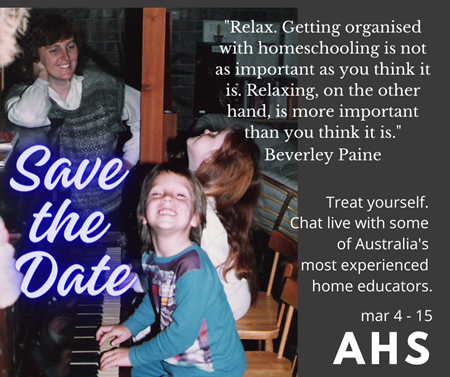|
Homeschooling in Practice: What Homeschooling Means for the Parent
an excerpt from the introduction to Getting Started with Homeschooling: Practical Considerations for Parents of School Aged Children
Part 2 - see Part 1 for the introduction to this article
Consistency is an important element in home education, and is achieved by thoroughly understanding your perception of how learning happens and what you hope to achieve.
Here are some general considerations to think about at this time:
- Are you prepared to spend a lot of time with the children, perhaps all day? Do you enjoy their company, doing what they want to, listening to their ideas? Do you respect and understand them and their needs? This looks easy on paper and you may be casually nodding your head - but it is harder than you think. Parents need their 'space' too. Children are very willing to give parents this space, provided their own needs for attention are met. Understanding that everyone has a need to be able to pursue their own interests and needs in their own way and time, is a good thing to encourage in families. Co-operation follows understanding.
- Which role do you see yourself best at - educational facilitator, mentor, resource person, co-learner and participant, adviser, friend, parent, teacher? Are you comfortable with the other roles? Can you develop them more? Do you know where, and are you prepared, to get help and advice? In schools, teachers have access to a wide variety of resources, professional development and support services. You will need to create your own.
- Are you prepared to take up and make the most of learning opportunities when presented, at any time of day? In the home learning environment you can continuously evaluate and plan the learning process for each child, based on their interests, knowledge and abilities. Continual access to the child allows for increased opportunity to 'catch' and extend the learning moment. Life at home as you know it, may change incredibly as the focus shifts from prescribed to spontaneous learning.
- Can you learn to be intuitive to your children's learning needs, to 'back off' when necessary, and to put your 'teaching' needs on hold? This involves recognising and understanding not only your child's learning needs, but your own perceptions about learning, and how these two may occasionally conflict. You will need to be very patient with yourself. This skill often takes years to develop. Don't expect miracles overnight - even teachers learn this only from many years of experience in the classroom.
- What is your own attitude to learning - do you find it easy, challenging, exciting, enjoyable, interesting, an adventure? Children learn first by example. Sometimes parents have had unhappy school experiences in their own childhood, and seek to rectify this with their own children. This may mean a shaky start to home schooling for the family, but time and experience smooth out the bumps, and parents can regain confidence in their own, as well as their children's, learning abilities. Whatever your level of education you will be able to embark on home schooling if you accept the knowledge that your have always been your children's first and most important educator. After all, it was you that helped them learn the difficult skills of walking and talking!
- Are you prepared to be flexible, willing to try different approaches, constantly evaluate the educational process, not only of the children, but your own too? Are you open to seeking out advice and help? There is no need to home school in a vacuum. The amount of information you can access and use is staggering.
- Do you have confidence in yourself and the children? Can you let them go at their own pace, gently prodding them with positive strokes? You need to develop strategies for building and maintaining confidence and support, both for them and yourself. Rigid timetables, deadlines and grading systems seldom work well with the ebb and flow of a busy family life, and are generally tailored not to the needs of individuals, but to external demands. Do you need them?
- Can you give yourself some time to be yourself, not parent, teacher, or slave to the house-hold chores? Will you be able to satisfy your own interests and needs? Are you aware of the real risk of 'burn-out' and how to avoid it? Parents who continually sacrifice themselves to their children's needs offer a poor example of adult life.
- Are you prepared to spend a long time home educating, perhaps even ten years or more - or as long as you need to? What about careers, finances, babies, etc? You may reach a point where you don't want to anymore, but your children do!
- Can you cope with being different; with opposition from your family, community; or from the authorities? We all need the approval of our peers, and unless you are able to secure a supportive network of friends who applaud your efforts, life may be an uphill battle of wavering confidence in your decision to home educate.
- Most importantly - do you have a sense of humour? Educating your children at home is a wonderful adventure, a time to treasure, but, like parenting, you need a sense of humour to survive it!

Was this article helpful? Was it worth $1.00 to you?
Your gift of $1 or more helps to keep this site operating
offering encouragement
and reassurance to families
wanting
better outcomes for their children.



Beverley Paine with her children, and their home educated children, relaxing at home.
Together with the support of my family, my aim is to help parents educate their children in stress-free, nurturing environments. In addition to building and maintaing this website, I continue to create and manage local and national home educating networks, help to organise conferences and camps, as well as write for, edit and produce newsletters, resource directories and magazines. I am an active supporter of national, state, regional and local home education groups.
"You've been an inspiration to me, I love the way
you really listen to people." Vanessa
"Whenever I read your writing I always come away
with increased confidence in my ability to provide and
share a wonderful learning journey with my family!" Davina
"Your guidance, understanding, support and words of
wisdom changed our lives. We now offer support and
organise many homeschooling events for others." Lesley
"Thank you once again for your prompt and friendly service.
I am convinced that your books are going to add
quality and peace of mind to my journey of teaching my kids
at home! Just from studying your website, until almost
2am
in the morning, I 've been encouraged!" Louisa
"Thank you for all your many,many reassuring words
over many, many years. You probably don't know exactly how
valuable you are to the Australian Home Education community.
I've been reading your stuff for maybe 8 years or more now.
And I'm very grateful." Gythaa


CLICK HERE
if you want to learn
how to write your own education plans
to suit
your unique children's
individual learning needs?
Or you are looking for quality curriculum and teaching tips...
|
|
Welcome to the World of Home Education
and Learning without School!
We began educating our children in 1985, when our eldest was five. In truth, we had helped them learn what they need to learn since they were born. I am a passionate advocate of allowing children to learn unhindered by unnecessary stress and competition, meeting developmental needs in ways that suit their individual learning styles and preferences. Ours was a homeschooling, unschooling and natural learning family! There are hundreds of articles on this site to help you build confidence as a home educating family. We hope that your home educating adventure is as satisfying as ours was! Beverley Paine
3 ESSENTIAL STEP BY STEP GUIDES
Let experienced home educators Beverley, Tamara and April walk you through HOW to create a learning plan that builds on solid foundations that works for YOUR family AND ticks all the boxes for home educaton registration!
|

Tap into Beverley's
experience
through her books
"Your books, your blogs helped me beyond words... they helped me to find comfort in knowing it is ok to choose exactly what is best for my family." Nisha
"Your books and information are mind blowing and already I am feeling good about this new experience." Diane
"Your guidance, understanding, support & words of wisdom changed our lives." Leslie
"I feel specially inspired by Beverley's words and, the more I read her comments, the more inspired I feel, since my need for support, respect for different parenting styles, and information are fully met." Marijo
|
 |
|

The information on this website is of a general nature only and is not intended as personal or professional advice. This site merges and incorporates 'Homeschool Australia' and 'Unschool Australia'.
The Educating Parent acknowledges the Traditional Aboriginal and Torres Strait Islander Owners, the Custodians of Australia, and pay our respects to Elders past and present and extend that respect to Aboriginal and Torres Strait Islander people viewing this website.

Advertise on this site.













Australia's premier online annual conferences, lifetime access to video and audio recordings, freebies, notes and associated resource guides.
EVERY SUMMIT IS UNIQUE!
$29 each  2023 2023   2022 2022   2021 2021
$25 each  2020 2020  2019 2019   2017 2017
"Biggest and best Aussie homeschool event of the year!"

Home education is a legal alternative
to school education in Australia.
State and Territory governments are responsible
for regulating home education and have different
requirements, however home educating families
are able to develop curriculum and learning programs
to suit the individual needs of their children.

Without revenue from advertising
by educational suppliers and Google Ads
we could not continue to provide information
to home educators. Please support us by letting
our advertisers know that you found them on
The Educating Parent. Thanks!
|
![]() About
About
![]() Blog
Blog
![]() Articles
Articles
![]() Curriculum
Curriculum
![]() Resource Directory
Resource Directory
![]() Shop
Shop
![]() Kids Pages
Kids Pages
![]() Facebook
Facebook

![]() SA
SA ![]() VIC
VIC ![]() NSW
NSW ![]() QLD
QLD ![]() TAS
TAS ![]() ACT
ACT ![]() NT
NT ![]() NSW
NSW ![]() QLD
QLD ![]() SA
SA ![]() WA
WA ![]() TAS
TAS ![]() ACT
ACT ![]() NT
NT 





















